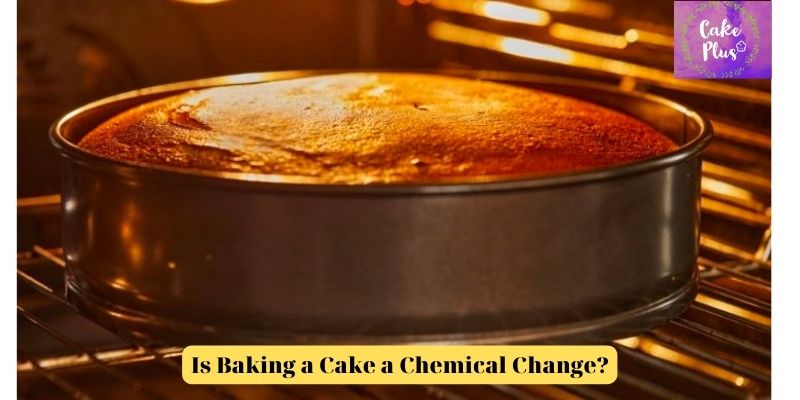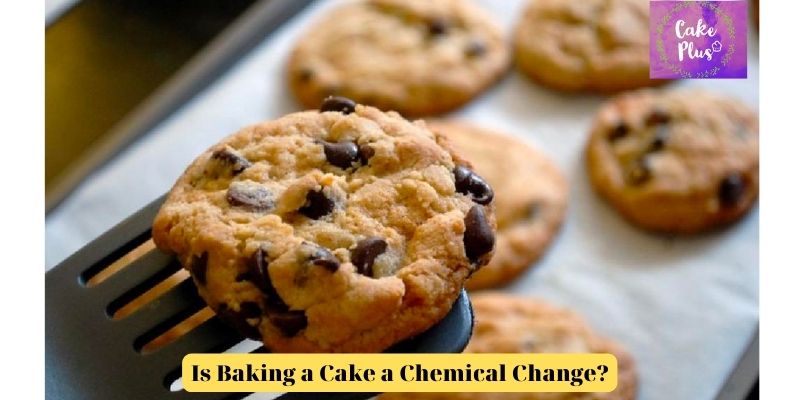News
Why Is Baking a Cake a Chemical Change? Find The Best Answer Here
Is Baking a Cake a Chemical Change? A chemical change also occurs when you bake a cake, in addition to combining the components and enjoying a light, fluffy, and extremely delectable delicacy. The fact that ingredients are changed into a new substance that cannot be undone when baking a cake is the biggest indicator that a chemical change is taking place. Next time you’re making a cake, consider the process from a scientific standpoint. How? Cakepluss.com assist you. Learn why Is Baking a Cake a Chemical Change in this article. There are several different ones, and they are all quite fascinating. Who is willing to learn?
Is Baking a Cake a Chemical Change Or Physical Change?

Both! Consider this: the cake batter appears one way when you pour it into the pan, but when you take it out of the oven, it looks entirely different, doesn’t it? It is undoubtedly mostly the result of chemical interactions, but you must keep in mind that you start with physical components before allowing the magic to work.
But why Is Baking a Cake a Chemical Change? – Well, when baking powder is exposed to heat, carbon dioxide from the powder is frequently emitted. To put it simply, bubbles start to form and become trapped, which causes the cake to rise. The uneven structures in a slice of cake that are visible when cut are mostly the result of a chemical reaction. Additionally, the rice isn’t only caused by a chemical reaction or baking powder. Heat, eggs, and the combination of the components all produce a chemical reaction. Every little thing is wonderful!
Why Is Baking a Cake a Chemical Change?

The four most significant signs that a chemical shift has occurred can be understood without knowing the intricacies of chemical changes:
- Smell: A cooked cake’s wonderful aroma is not merely a result of the components blending together. It’s because a chemical alteration has taken place. It is obvious that a chemical change has taken place because the smell from the batter to the completed cake is different.
- Heat: Heat is another sign. It emits or absorbs heat when something has undergone a chemical change. In this instance, cakes undergo an endothermic reaction, which involves the absorption of heat.
- Gas: When a cake is baked, gases are generated that turn the sticky batter into a light, fluffy, airy, and flawlessly textured dessert.
- It is irreversible: Our last indication that baking a cake causes a chemical change is the fact that you cannot unbake a cake. The original ingredients (eggs, sugar, flour, etc.) are turned into a cake, leaving the original components remain.
We may confidently assert that baking a cake is, in fact, a chemical reaction because it exhibits all four signs of a chemical change. New bonds are generated during the chemical transformation that takes place as the batter is baked in the oven, producing the finished product.
How Does Baking Affect Chemical Reactions?

You now understand that baking a cake results in an irreversible chemical change. But what actually occurs in the background? As your cake bakes in the oven, a number of different chemical processes occur. While a cake is baking, the following chemical processes occur:
- Tiny gas bubbles are created to raise the cake when baking powder is heated. So instead of a thick, gooey batter, you’re left with something that’s light and fluffy.
- Heat also triggers a chemical reaction in the proteins in eggs, firming the components and preventing any sinkage to produce the finished result.
- The chemical process known as the Maillard reaction, which happens to sugar, results in the browning of cakes’ exteriors.
- Finally, oil is required to prevent the cake from becoming dry as a result of chemical reactions brought on by the heat. Consider it a moisture barrier for the interior.
FAQs
1. Is a cake’s mixing a chemical change?
A reaction takes place there in the basin as you combine the components for the cake batter. How? In the beginning, you combine the components by chopping them up and crushing them together. Additionally, certain compounds begin to react when exposed to dampness, for example. Baking soda and powder are a good example; when they are exposed to moisture, they begin to release gasses.
2. Does Baking Bread Change Chemicals?
In a big way! Keep in mind that you are working with yeast; yeast reacts when exposed to heat or moisture, nearly exactly like baking powder.
3. How does a cake get its rise?
A cake’s ability to rise is entirely due to the chemical reactions that baking powder causes. Heat causes carbon dioxide bubbles to develop and become trapped, which makes the cake rise.
You are not just a master baker, but you are also a little bit of a scientist. The following time someone asks you Is Baking a Cake a Chemical Change, you may confidently respond “yes” and provide them with the four signs: odor, heat, gas, and an irreversible change. Do you realize that a cake being baked causes a chemical change? Have you got anything to add to our factual response?


